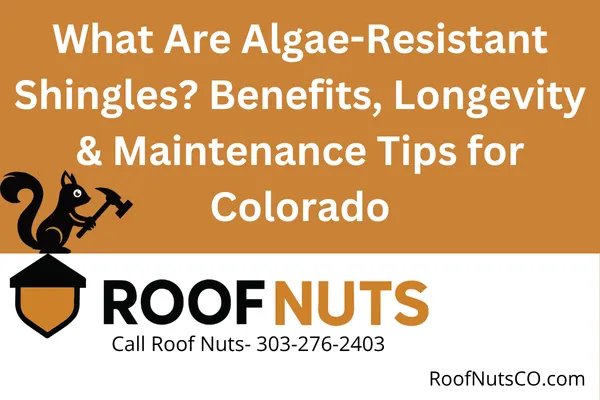
What Are Algae-Resistant Shingles? Benefits, Longevity & Maintenance Tips for Colorado
Algae-Resistant Shingles: What Colorado Homeowners Need to Know
If you’re dealing with dark streaks on your shingle roof, there’s a good chance it’s algae—not dirt. In Colorado’s mix of sun, shade, and moisture, algae growth is common on asphalt roofs, especially on north-facing slopes.
Algae-resistant shingles offer a simple, long-term solution.
What Are Algae-Resistant Shingles?
Algae-resistant (AR) shingles are asphalt shingles with added copper or zinc granules. These metals stop algae from growing on the shingle surface.
Copper granules are most commonly used.
These granules release ions when wet, which disrupt algae growth.
They’re built into the shingle—not applied later—so they last as long as the shingle does.
Why Algae-Resistant Shingles Matter in Colorado
Colorado’s climate is dry—but many neighborhoods still deal with algae problems. The culprits?
Sprinkler systems spraying roof edges
Shaded roof areas (especially in Denver, Lakewood, and Fort Collins)
North-facing slopes with limited sun exposure
Without protection, blue-green algae (Gloeocapsa magma) can leave dark streaks across your roof that:
Lower curb appeal
Accelerate aging of shingles
Trap moisture and increase mold risk
Potentially impact insurance claims or real estate sales
How Long Do Algae-Resistant Shingles Last?
Algae resistance typically lasts 10 to 15 years, depending on:
The percentage of copper granules
Roof pitch and orientation
Local weather patterns
Some premium shingles include higher concentrations of copper and offer limited lifetime warranties for algae resistance.
Are Algae-Resistant Shingles Worth It?
In most Colorado neighborhoods, yes. While they cost slightly more than standard asphalt shingles, the benefits often outweigh the extra cost:
No need for repeated roof cleanings
No risk of damaging your shingles with bleach or pressure washing
Longer-lasting roof appearance
Enhanced resale value
For HOAs or commercial properties (like in Arvada or Westminster), algae resistance is a must for maintaining visual standards.
Maintenance Tips for Algae-Resistant Roofs
Keep gutters clean: Prevent runoff and water accumulation.
Trim overhanging branches: Sunlight helps dry the roof.
Avoid power washing: It can void warranties and damage shingles.
Use zinc or copper strips at the ridge to extend algae protection.
FAQ: Algae-Resistant Shingles
What causes roof algae in Colorado?
Moisture, shade, and organic debris. Sprinklers and tree cover are common triggers.
Can I add algae resistance to an existing roof?
Not reliably. Field-applied treatments don’t last and may void the manufacturer’s warranty.
Do algae-resistant shingles come in all styles?
Yes. Most major brands offer algae-resistant options in architectural and designer styles.
Are these shingles more eco-friendly?
They reduce the need for chemical cleanings and extend roof life, making them a greener choice.
Need help deciding if algae-resistant shingles are right for your home or commercial building in Denver, Colorado Springs, or Pueblo?
Call Roof Nuts today at 303-276-2403
Or request a quote at https://RoofNutsCO.com
We’ll inspect your roof and recommend the best protection based on your exposure and budget.
